The US Sentencing Commission has again called on Congress to act to reduce sentencing inequities around the federal crack cocaine laws. Will Congress finally listen this time?
Arnold Trebach wrote "The Heroin Solution" in 1982. That it is still relevant and relevatory is a sad commentary on how far we've come since then. We review it on the occasion of its republication.
Educate and motivate your friends to respectfully assert their rights during police encounters, with these fourth amendment t-shirts from our friends at Flex Your Rights!
Two re-released classics and one new volume by drug reform pioneer Arnold Trebach make up DRCNet's latest premium offer for our members.
In addition to the weekly reporting you see here in the Chronicle, DRCNet also features daily content in the way of blogging, news links, redistributed press releases and announcements from our allies and more.
Tarnished badges abound this week. We've got a cop who got too high on his own brownies, missing drug evidence, a head narc busted for ripping-off drug dealers, a cop busted for taking bribes from drug dealers, a couple more cops pleading guilty to protecting drug shipments, and the requisite jail guard dealing drugs.
Maryland Gov. Martin O'Malley Wednesday vetoed a bill that would have allowed second-time drug sales offenders parole eligibility. Instead, they will remain locked up doing 10-year mandatory minimum sentences.
An amicus brief by advocates strongly made the case that prosecutions drive pregnant women away from the health care system and thereby hurt, not help.
A bill that would eventually allow California farmers to grow hemp has passed the state Assembly and is expected to pass the Senate. Last year, Gov. Schwarzenegger vetoed a similar bill.
With Nevada prisons bursting at the seams, state Supreme Court justices went to the legislature Monday to ask for more discretion in sentencing and more funding for drug and mental health courts.
In the highest-profile killing yet in the current round of Mexico's drug wars, unknown assailants gunned down a leading anti-drug official in Mexico City Monday.
Hungary's Global Marijuana Marches came a week later than elsewhere, and they ran into some problems with rightist thugs and recalcitrant local officials. Now, the organizers are suing.
Over-hyped Australian media accounts of "super dope" marijuana about to invade the country are dovetailing with efforts to crack down on bongs.
Events and quotes of note from this week's drug policy events of years past.
Support the cause by featuring automatically-updating Drug War Chronicle and other DRCNet content links on your web site!
A new way for you to receive DRCNet articles -- Drug War Chronicle and more -- is now available.
Visit our new web site each day to see a running countdown to the events coming up the soonest, and more.

the late Lillie Blevins, served life sentence for a crack cocaine ''conspiracy'' after being convicted on the word of a snitch who received probation in return (courtesy november.org)
In its
annual report to Congress, the US Sentencing Commission has once again called on legislators to reduce the tough penalties for federal crack cocaine offenses. The commission's previous calls to fix the 100:1 disparity between the amount of crack and the amount of powder cocaine necessary to trigger mandatory minimum sentences have either been ignored or slapped down by previous Congresses. Whether the new Democratic majority in Congress will allow reform to be accomplished this year remains to be seen.
Under federal law in effect since 1987, someone charged with possessing five grams of crack faces a mandatory minimum five-year sentence. By contrast, it takes 500 grams of powder cocaine -- one hundred times as much -- to trigger the same sentence.
While the Sentencing Commission cannot itself enact changes in the crack cocaine law -- that's up to Congress -- it has already signaled its impatience with congressional inaction. A little more than two weeks ago, the commission adjusted federal sentencing guidelines for crack cocaine offenses so that crack offenders will serve on average about a year less than under the old guidelines. That move alone will provide small relief to thousands of federal crack prisoners.
But the real problem is the harsh mandatory minimums for federal crack offenses. The Sentencing Commission found that:
- The current quantity-based penalties overstate the relative harmfulness of crack cocaine compared to powder cocaine.
- The current quantity-based penalties sweep too broadly and apply most often to lower level offenders.
- The current quantity-based penalties overstate the seriousness of most crack cocaine offenses and fail to provide adequate proportionality.
- The current severity of crack cocaine penalties mostly impacts minorities.
"Based on these findings," the report read, "the Commission maintains its consistently held position that the 100-to-1 drug quantity ratio significantly undermines the various congressional objectives set forth in the Sentencing Reform Act." While noting that setting appropriate thresholds is "a difficult and imprecise undertaking that ultimately is a policy decision," the Commission nevertheless "strongly and unanimously" urged Congress to adopt the following recommendations:
- Increase the five-year and ten-year statutory mandatory minimum threshold quantities for crack cocaine offenses to focus the penalties more closely on serious and major traffickers as described generally in the legislative history of the 1986 Act.
- Repeal the mandatory minimum penalty provision for simple possession of crack cocaine under 21 U.S.C. § 844.
- Reject addressing the 100-to-1 drug quantity ratio by decreasing the five-year and ten-year statutory mandatory minimum threshold quantities for powder cocaine offenses, as there is no evidence to justify such an increase in quantity-based penalties for powder cocaine offenses (e.g., don't increase powder cocaine sentences).
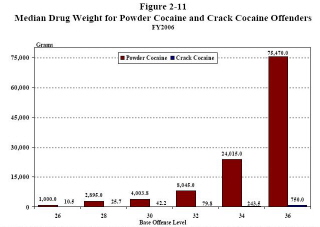
graph from report, crack cocaine amounts nearly invisible next to the powder amounts
Groups that have long advocated for reform of the crack-powder cocaine sentencing disparity and the removal of mandatory minimum sentences reacted with pleasure mixed with a hint of impatience. They have been waiting a long time for action on this front.
"The prisoners, children and families torn apart by these unjustifiably harsh penalties are watching closely and will welcome crack sentencing reforms that restore some justice to crack penalties," said Mary Price, vice president and general counsel of Families Against Mandatory Minimums (FAMM). "Only Congress can change our harsh mandatory minimum crack laws. Lawmakers should not squander the important opportunity presented by the most recent set of findings and recommendations by the Sentencing Commission. The time is ripe for reform, especially given the bipartisan support for crack sentencing reform that has emerged in recent years."
"The current sentencing structure has had a disproportionate and unfair impact on African-American and low income communities," said Caroline Fredrickson, director of the ACLU's Washington Legislative Office, "and we're encouraged that the US Sentencing Commission has once again acknowledged this fact. But 2007 marks the fourth time in 20 years that the commission has issued such a report, and Congress has yet to address the problem. Years of medical and legal research have shown no appreciable difference between crack and powder cocaine, and no justification for allowing the vast sentencing gap between them to stand. We urge Congress to put aside politics and act now to fix this discriminatory federal drug sentencing policy."
But it is not reform advocates but members of Congress who will or will not enact most reforms. While in the past, Congress has rejected such recommendations from the Commission, there are some indications support for reforms is growing.
"It's past time to reduce the disparity between crack and powder cocaine sentences actually," Republican Sen. Jeff Sessions told National Public Radio, "because the penalties on crack cocaine are extraordinarily heavy -- too heavy to be justified as public policy." His colleagues should listen to the Commission, Sessions added. Sessions has already introduced a bill that would reduce the disparity to 20:1.
Another key player, Sen. Patrick Leahy (D-Vermont), head of the Senate Judiciary Committee, told the legal publication the Daily Journal the report's findings were "an important first step" in correcting the sentencing disparity. "For far too long, the federal crack/powder sentencing laws have created an injustice in our nation," he said. Leahy said he hopes that federal prosecutors will focus more on drug kingpins.
Sen. Joe Biden (D-Delaware), who has announced his candidacy for the 2008 Democratic presidential nomination, has also weighed in. "This 100:1 disparity is unjust, unfair, and the time has long past for it to be undone," Biden said in a Tuesday press release. "The current sentencing disparity between the two forms of cocaine is based on false notions and old logic," said Sen. Biden. "Congress has ignored this issue for too long. I intend to introduce legislation to remedy the disparity and refocus the federal cocaine sentencing laws and federal resources on major drug kingpins, as was the intent of the 1986 law. I look forward to working with my colleagues -- Republicans and Democrats -- and urge them to support righting this wrong."

DEA crack cocaine photo
"There is indeed growing support for reducing the disparities," said Bill Piper, head of national affairs for the
Drug Policy Alliance. "Biden, Sessions, and Sen. Hatch [R-Utah] are all working on bills, and so is Charley Rangel [D-New York] in the House," he told Drug War Chronicle. "There is growing support in the judiciary committees for doing something."
But, Piper warned, the devil is in the details. "They agree that something needs to be done, but I'm not sure they will reach agreement on what needs to be done. Then it would have to pass floor votes, and then we have to wonder if Bush would veto it," he said. "But when you have the Sentencing Commission and leading Republicans signing off on something, the Democrats should be emboldened. That shows this is a bipartisan effort."
Even the Justice Department is wavering. While Piper noted that the department has long taken the position that there was no problem, department spokesman Bryan Sierra told the Daily Journal this week that the agency is "willing to discuss the disparity in the ratio for sentencing between crack and powder cocaine," but he added that the department believes that "it should be done in the broader context of sentencing reform."
For the fourth time since 1995, the Sentencing Commission has urged Congress to act to reduce the disparity and bring greater fairness to sentencing. Now it is in Congress' hands.
back to top
Phillip S. Smith, Writer/Editor
(Click here to order "The Heroin Solution or other books by Arnold Trebach through DRCNet's latest book offer.)
When "The Heroin Solution" was first published by Yale University Press a quarter-century ago, it got rave reviews from the likes of the New York Times and Publishers Weekly. It was a mindblower. For the vast majority of readers, Arnold Trebach opened a window into an astonishing world they had never before imagined, one where -- gasp! -- doctors, not policemen, dealt with heroin and heroin users.
Trebach, who from his base at American University began influencing a generation of disciples and who founded the Drug Policy Foundation (the progenitor of the Drug Policy Alliance) in 1986, is now known as the grand old man of the American drug reform movement, and the success of "The Heroin Solution," along with his 1987 "The Great Drug War," played a big role in cementing that reputation.
What Trebach did in the "Heroin Solution" was tell three interwoven stories: the story of heroin, the story of the American approach to heroin, and the story of the British approach to heroin. For many, that book was an awakening, a realization that there was an alternative to what by 1982 was already being reviled as an atrocious and failing policy of prohibition and repression. Where the American system denied that heroin had any medical utility whatsoever and jailed physicians, junkies, and hapless pain patients alike, the British system was kinder and gentler, with doctors given considerable latitude to prescribe heroin even -- and especially -- in cases where they knew they were only allowing their patients to maintain their addiction.
Now, "The Heroin Solution" is out in a second edition, the last volume of the "Trebach Trilogy," which also includes the reprinted "The Great Drug War" and last year's "Fatal Distraction." But this edition of "The Heroin Solution" is not a substantive reworking of the material; the only addition to the original volume is a new preface.
It still makes timely and compelling reading, but the reason why is hardly good news. "The Heroin Solution" is still relevant because we have progressed so little since it was written. The issues Trebach addressed in 1982 are, in many cases, the same issues we face today. Much has happened, but little has changed, and much of what has changed has changed for the worse.
In Britain, which Trebach described as a model of an enlightened (if not perfect) approach to heroin, the heavy hand of the state and governing medical bodies has slowly shrunk the space in which doctors may prescribe heroin. When Trebach wrote, probably a few thousand British addicts were being prescribed heroin; in his new preface, he estimates that perhaps 500 are. For all the talk of opiate maintenance in Britain, it seems like for the past quarter-century it seems like it's been one step forward, one step back.
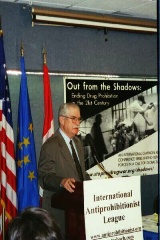
Arnold Trebach at 2003 press conference on which DRCNet collaborated
Trebach decried the cruel and inhumane treatment of physicians and pain patients alike in "The Heroin Solution." If anything, the problem has gotten worse in the intervening quarter-century. One thing the book offers, though, is some perspective. The latest round of pain doctor persecutions smell remarkably similar to those of doctors Trebach mentioned operating back in the 1930s. It's a similarity Trebach notes himself in his preface to the new edition, where he cites the case of Dr. William Hurwitz, who just weeks ago was convicted again on federal drug charges for loose prescribing practices and faces possible decades in prison. (He's already been in for two years.)
Trebach asked in 1982 where America found itself nearly seven decades after passage of the Harrison Narcotics Act, and was not happy with the answer. It's much worse now. Back then, Trebach complained that the federal government spent $6 billion fighting the drug war in the 1970s; now $6 billion would fund the federal drug war for about three months. Since then, the prison population of the United States and the number of drug prisoners has gone through the roof. You know the drug war litany.
Trebach does, too, and that is part of the reason his thinking about drug prohibition has evolved over time. When he wrote "The Heroin Solution" in 1982, he called only for doctors to be allowed to prescribe heroin. Now, he is a full-blown anti-prohibitionist. Lack of progress on reforming US drug policy breeds more radical responses.
A revised and updated "The Heroin Solution" would be nice. There could be new chapters on the cutting-edge work on heroin maintenance going on in Switzerland and Germany, Spain and the Netherlands; the rise of safe injection sites; the trials in Vancouver; the spread of heroin addiction in Iran, Pakistan, and the Central Asian republics; and contemporary use patterns in the West, among others.
But 25 years after it was first published, "The Heroin Solution" is still relevant, still revelatory, and still a good read. Or, as Publishers Weekly said the first time around, "A blockbuster!"
(Click here to order "The Heroin Solution or other books by Arnold Trebach through DRCNet's latest book offer.)
back to top
 As our latest membership premium, DRCNet is pleased to offer t-shirts from our friends at the group Flex Your Rights -- white t-shirts reading "I Don't Consent to Searches" and black t-shirts reading "Got a Warrant?," both with the text of the 4th amendment on the back. Flex Your Rights is the maker of a video that more than 800 DRCNet subscribers have bought from us, "Busted: The Citizen's Guide to Surviving Police Encounters." I wear Flex Your Rights shirts all the time, and they've gotten me into many conversations, but never into trouble.
As our latest membership premium, DRCNet is pleased to offer t-shirts from our friends at the group Flex Your Rights -- white t-shirts reading "I Don't Consent to Searches" and black t-shirts reading "Got a Warrant?," both with the text of the 4th amendment on the back. Flex Your Rights is the maker of a video that more than 800 DRCNet subscribers have bought from us, "Busted: The Citizen's Guide to Surviving Police Encounters." I wear Flex Your Rights shirts all the time, and they've gotten me into many conversations, but never into trouble.
Donate $30 or more to DRCNet take your pick of the two shirts -- donate $55 or more to get both! Donate $50 and we'll send you a shirt AND a copy of Busted -- or $75 to order Busted and both shirts!
 We also continue all our other recent offers -- "Lies, Damn Lies, and Drug War Statistics," the three Arnold Trebach books, StoptheDrugwar.org merchandise, many more. Visit our donation page online to view all the offerings in the righthand column.
We also continue all our other recent offers -- "Lies, Damn Lies, and Drug War Statistics," the three Arnold Trebach books, StoptheDrugwar.org merchandise, many more. Visit our donation page online to view all the offerings in the righthand column.
Your donation will help DRCNet as we advance what we think is an incredible two-year plan to substantially advance drug policy reform and the cause of ending prohibition globally and in the US. Please make a generous donation today to help the cause! I know you will feel the money was well spent after you see what DRCNet has in store. Our online donation form lets you donate by credit card, by PayPal, or to print out a form to send with your check or money order by mail.
 Please note that contributions to the Drug Reform Coordination Network, our lobbying entity, are not tax-deductible. Tax-deductible donations can be made to DRCNet Foundation, our educational wing. (Choosing one or more gifts will reduce the portion of your donation that you can deduct by the retail cost of the item.) Both groups receive member mail at: DRCNet, P.O. Box 18402, Washington, DC 20036.
Please note that contributions to the Drug Reform Coordination Network, our lobbying entity, are not tax-deductible. Tax-deductible donations can be made to DRCNet Foundation, our educational wing. (Choosing one or more gifts will reduce the portion of your donation that you can deduct by the retail cost of the item.) Both groups receive member mail at: DRCNet, P.O. Box 18402, Washington, DC 20036.
Thank you for your support, and hope to hear from you soon.
Sincerely,

David Borden
Executive Director
back to top
Update to original offer: Trebach has agreed to sign all copies of his books that you get from DRCNet! Also, add just $22 or more to your donation to get a copy of Lies, Damn Lies, and Drug War Statistics too! (Make a note in the comment box to let us know you're requesting this.)

Arnold Trebach at 2003 press conference on which DRCNet collaborated
We are pleased to announce that our latest premium book offer for members is the "Trebach Trilogy" -- two re-released classics by Arnold Trebach -- a long-time friend of DRCNet, founder of the Drug Policy Foundation and known to reform cognoscenti as the father of the modern drug policy reform movement -- and one newly-minted volume:
- The Heroin Solution: "A blockbuster," says Publishers Weekly. "Eloquent and persuasive," according to The New York Times.
- The Great Drug War, and Rational Proposals to Turn the Tide: Two decades ago, in what was a heartfelt indictment of the Reagan-era war on drugs, Trebach identified and brought to vivid life all sorts of abuses derived from the effort to enforce drug prohibition and began to elaborate a strategy for escaping from drug war and achieving "drug peace." (Drug War Chronicle)
- Fatal Distraction: The War on Drugs in the Age of Islamic Terror: [T]he distillation of a life's work in the trenches of drug law reform... a book grizzled reformers and bright-eyed newcomers to the cause alike will want to read and absorb. (Drug War Chronicle)
Please help DRCNet's work with a generous donation. If your donation is $35 or more, we'll send you a complimentary copy of any one of the Trebach books -- or donate $65 or more and choose two, or $90 or more for all three.
Your donation will help DRCNet as we advance what we think is an incredible two-year plan to substantially advance drug policy reform and the cause of ending prohibition globally and in the US. Please make a generous donation today to help the cause! I know you will feel the money was well spent after you see what DRCNet has in store. Our online donation form lets you donate by credit card, by PayPal, or to print out a form to send with your check or money order by mail. Please note that contributions to the Drug Reform Coordination Network, our lobbying entity, are not tax-deductible. Tax-deductible donations can be made to DRCNet Foundation, our educational wing. (Choosing gift items will reduce the portion of your donation that you can deduct by the retail cost of the item.) Both groups receive member mail at: DRCNet, P.O. Box 18402, Washington, DC 20036.
Read Chronicle editor Phil Smith's review of The Great Drug War here, and Phil's review of Fatal Distraction here, and Phil's review of The Heroin Solution here.

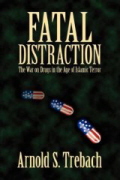
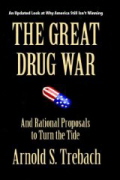
back to top
Along with our weekly in-depth Chronicle reporting, DRCNet has since late summer also been providing daily content in the way of blogging in the Stop the Drug War Speakeasy, as well as Latest News links (upper right-hand corner of most web pages), event listings (lower right-hand corner) and other info. Check out DRCNet every day to stay on top of the drug reform game!

Speakeasy photo, with flappers (courtesy arbizu.org)
This week:
David Borden on "Big News: Sentencing Commission Crack Cocaine Sentencing Report is Out," "Initial Hurwitz Prosecutor Resigns from DOJ #2 Post," "Maryland Drug Reform Bill and Veto Threat," and many links to many blog posts and articles out there on the net.
Phil Smith on "Fighting Meth With Misinformation in Idaho," and "Cannabis Cash 'Funds Islamist Terrorism'"--Here we go again."
Scott Morgan on "Czar Wars," "Australia: Better Bud Prompts Proposed Bong Ban," "Narc Team Rams Suspect's House With Vehicle, Finds Marijuana," "If Only Afghanistan Were More Like Colombiaâ¦" (title is sarcastic), "God Declares War On Drugs," "Marijuana Now Causes Homosexual Incest. That's What They're Saying," and "USA Today Takes Firm Stance on Student Drug Testing: Neutral."
Special guest blogger Allan Clear, executive director of the Harm Reduction Coalition, reports from the 18th International Conference on the Reduction of Drug Related Harm in Warsaw.
Over in the Reader Blogs, drug war victim Dale Kent has decided to fight the rap and to speak out; and long-time activist Carl Olsen posts a sadly typical letter he received from Sen. Tom Harkin and his response.
David Guard has been busy too, posting a plethora of press releases, action alerts, job listings and other interesting items reposted from many allied organizations around the world in our "In the Trenches" activist feed. DRCNet's Reader Blogs have been going too -- we invite you to join them and become an author in the DRCNet community too. And we urge you to comment on any or all of the above.
Thanks for reading, and writing...
back to top
Tarnished badges abound this week. We've got a cop who got too high on his own brownies, missing drug evidence, a head narc busted for ripping-off drug dealers, a cop busted for taking bribes from drug dealers, a couple more cops pleading guilty to protecting drug shipments, and the requisite jail guard dealing drugs. Let's get to it:
In Dearborn, Michigan, a Dearborn police officer resigned after admitting taking marijuana from a suspect and cooking it up into pot brownies with his wife. Former Cpl. Edward Sanchez went down after he got too high on his creation and called 911 to report he was afraid he and his wife were in danger of a fatal overdose. "I think we're dying," he said in the call. "We made brownies and I think we're dead, I really do," Sanchez continued. (Listen to the call here.) During a departmental investigation after that call, Sanchez admitted taking marijuana from suspects on previous occasions. Sanchez's wife, Stacy, admitted that on another occasion she had removed enough cocaine from her husband's patrol car to go on a three-week binge. The cocaine was purportedly in the car for drug dog training. Neither has been charged with a crime.
In Schenectady, New York, a Schenectady County grand jury is looking into missing drug evidence at the Schenectady Police Department. The probe into the city's vice squad comes after a State Police investigation found crack cocaine and marijuana evidence missing in 16 drug cases. The grand jury will reportedly look at departmental procedures for storing and tracking drug evidence. In the wake of the discovery of missing drug evidence, the department has already instituted some changes, including requiring that two officers be present whenever an officer enters the drug storage area.
In Santa Fe, New Mexico, the head of the narcotics division and one other officer are accused of ripping-off a drug dealer for thousands of dollars. The head narc, Sgt. Steve Altonji, and Officer Danny Ramirez were arrested by FBI agents May 11 and face a combined 24 federal counts. The FBI alleges that Altonji and Ramirez arrested a drug dealer in May 2006 and discovered marijuana, cocaine, and $180,000 cash. They are accused of taking $5,000 for themselves. Altonji faces additional charges that he stole money from another dealer and beat up a third man, while Ramirez continues to be investigated for several large cash bank deposits. Suspicions about Altonji have been going on for months, earlier prompting Santa Fe Police Chief Eric Johnson to shut down drug investigations while the city does an internal review.
In Lake City, Florida, a Lake City police officer was charged Tuesday with taking money from a drug dealer. Lake City Police Investigator Debra Williams, a seven-year veteran of the department, has been under investigation since December for allegedly taking the cash and telling the dealer she would have drug charges against him dismissed. She has been suspended since March. Now she faces one count of misconduct in office.
In Boston, a Suffolk County jail guard was arrested May 11 for selling drugs to inmates. Kenneth Nobile, 39, was arrested as he arrived at work at the South Bay Correctional Facility, and police allegedly found seven grams of heroin and 21 grams of marijuana packaged for sale in his car. He faces various drug charges, including possession of heroin with intent to distribute. Bail was set at $25,000.
In Hollywood, Florida, two more Hollywood police officers pleaded guilty last week to protecting heroin shipments. Officer Thomas Simcox pleaded guilty May 9 and Sgt. Jeffrey Courtney pleaded guilty May 11 to a single charge of conspiracy to possess heroin with the intent to distribute for their roles in protecting heroin shipments in what was actually an FBI sting. Two other officers have already pleaded guilty in the sting, known as Operation Tarnished Badge, in which the four also provided protection for shipments of stolen guns and jewelry. All four face mandatory minimum 10-year sentences, but all are seeking reductions for cooperating with investigators investigating who leaked the fact that there was an investigation.
back to top
Maryland Gov. Martin O'Malley (D) Wednesday vetoed a bill that would have provided the possibility of parole to people serving second-time drug sales sentences. Under current Maryland law, such offenders must serve a mandatory minimum 10-year sentence with no possibility of parole. The law would not have applied to violent offenders.
But in an interview with the Associated Press explaining his veto, O'Malley said he considered drug dealing to be a violent crime in itself. "Drug dealing is a violent crime, and the morgues of many of our counties and state are filled with the bodies that have been taken far too early because of drug distribution," O'Malley said. Maryland already provides opportunities for second-offenders to get drug treatment, he claimed, adding that the bill "unnecessarily broadens current law and makes parole a possibility, however remote, for drug dealers who are driven by greed and profit supported by violence, not addiction."
The bill, HB 992, passed the legislature with bipartisan support and was backed by a broad coalition of drug reformers, the faith community, public health and law enforcement officials, and drug treatment providers, as well as the Washington Post and the Baltimore Sun. The coalition is not happy with O'Malley.
"The veto is a disappointing mistake," said Justice Policy Institute executive director Jason Zeidenberg. "Instead of taking a baby step in the right direction towards treatment instead of prison, O'Malley is stubbornly clinging to the failed tough on crime policies of the past. The governor failed to show leadership and vision in this decision."
"Governor O'Malley has put Maryland out of step with other states that are moving in the direction of smarter, more effective sentencing policies," said Naomi Long, director of the Drug Policy Alliance District of Columbia Metropolitan Area project. "This veto was a lapse of leadership, and hurts Maryland's efforts to implement the kinds of real reforms that would actually make a difference."
The state of Maryland spends millions of dollars each year incarcerating nonviolent drug offenders, the vast majority of whom would be better served by drug treatment options. A recent report by the Justice Policy Institute found that Maryland's sentencing laws disproportionately affect communities of color and may be the least effective, most expensive way to promote public safety.
"The fight for more effective and fair sentencing policies isn't over," said Delegate Curtis Anderson (D-Baltimore), a sponsor of the legislation. "Maryland voters want more fair and effective sentencing policies. We will keep working with the governor to implement those reforms."
back to top
In a case that pitted hard-nosed legislators and prosecutors against an array of women's rights, public health, medical, and drug reform groups, the New Mexico Supreme Court ruled May 11 that a state law expanding criminal child abuse laws to include drug use by pregnant women was unconstitutional. In a summary opinion, the state high court upheld a state Court of Appeals decision that reached the same conclusion.
The ruling came in the case of Cynthia Martinez, who was charged with felony child abuse in 2003 after her newborn child tested positive for cocaine. Under the law in question, she was charged with "permitting a child under 18 years of age to be placed in a situation that may endanger the child's life or health" by ingesting illicit drugs while pregnant.
While the state argued that a pregnant woman who is addicted to drugs should be sent to jail as a felony child abuser, both the appeals court and the state Supreme Court disagreed. During oral arguments, the justices appeared to be particularly concerned about issues raised in an amicus curiae brief submitted by the Drug Policy Alliance and National Advocates for Pregnant Women on behalf of nearly three dozen other leading medical and public health organizations, physicians, and scientific researchers. The justices repeatedly mentioned the DPA/NAPW brief and expressed grave concerns about the deterrent effect such prosecutions would have on women seeking prenatal care.
Such rulings are critical to avoid criminalizing poor women, said NAPW staff attorney Tiloma Jayasinghe. "Making child abuse laws applicable to pregnant women and fetuses would, by definition, make every woman who is low-income, uninsured, has health problems, and/or is battered who becomes pregnant a felony child abuser," she explained. "In oral argument, the state's attorney conceded that the law could potentially be applied to pregnant women who smoked."
Szczepanski said, "I hope that this case serves as a reminder that pregnant women who are struggling with drug use should be offered prenatal care and drug treatment, not prosecution. There are better ways to protect our children in New Mexico, and ensure that future generations will be safe and healthy."
back to top
A bill that would allow California farmers to grow non-psychoactive hemp passed the Assembly May 10 and now heads to the state Senate, where it is also expected to pass. A similar bill passed the legislature last year, only to be vetoed by Republican Gov. Arnold Schwarzenegger.
Authored by Assemblyman Mark Leno (D-San Francisco) and Assemblyman Chuck DeVore (R-Irvine), AB 684 would pave the way for California farmers to eventually -- not immediately -- grow the plant, which is used to make food, clothing, paper, body care, bio-fuel, and auto products. If the bill were to be signed into law, industry organizations like Vote Hemp and the Hemp Industries Association, as well as the California Certified Organic Farmers, have vowed to challenge the federal ban on hemp planting.
Schwarzenegger cited the federal ban when he vetoed last year's hemp bill. He claimed it would put farmers in jeopardy of federal prosecution. But proponents of this year's bill are hopeful the governor will relent.
"Passage of the hemp farming bill in the Assembly is a sign it is likely to reach Governor Schwarzenegger's desk for the second year in row," said Vote Hemp legal counsel and San Francisco Attorney Patrick Goggin. "The mood in Sacramento is this bill is consistent with California's effort to be leader on US environmental policy. Hemp is a versatile plant that can replace polluting crops such as cotton and is taking off as an organic food and body care ingredient. It is time to jump into the expanding market for hemp that California companies currently import from Canada and elsewhere."
American hemp product manufacturers currently have to import their raw material from China, Canada, or one of the more than 30 other countries that allow hemp production. It is the only crop that is illegal to grow in the US, but legal to import.
back to top
Two Nevada Supreme Court justices appeared before the state Senate Judiciary Committee Monday to argue for increased discretion in sentencing and increased funding for drug and mental health programs, including drug courts. Nevada enacted mandatory minimum drug laws in 1995 that have contributed to an ever-increasing prison population.
Justice Jim Hardesty asked lawmakers to consider amending the sentencing laws to allow judges to deviate from the mandatory minimums as long as they submit written explanations of why the downward deviation was appropriate. Hardesty cited the senselessness of some drug sentences.
"It makes absolutely no sense for us to sentence a young man to 10 to 25 years in the Nevada state prison who gets paid $150 to drive a car from Sacramento to Utah" containing narcotics, Hardesty told the committee. He added that current law does not allow judges to deviate from sentencing rules or allow prosecutors to makes deals in such cases.
Hardesty was joined by Chief Justice Bill Maupin in asking committees that control spending to allot more money for drug and mental health court programs that can divert offenders from prison. "When I first heard about this program, I was very skeptical," Maupin told the committee. "What I found out was that mental health courts around this country have become very well recognized as having permanent success."
Hardesty added that the Supreme Court had requested $5 million in state general funds to pay for drug courts and treatment programs, but a budget subcommittee had only voted to approve $1 million. "Compared to what we requested, and compared to frankly what the demand is -- which is $30 million -- it was disappointing," said Hardesty.
While the justices have so far been unable to win increased funding for diversion programs, Nevada Gov. Jim Gibbons (R) is calling on the legislature to spend $300 million on new prison construction. Nevada currently has more than 13,000 prisoners and is admitting more than 600 new ones each month, nearly double the rate of admissions in 1990.
As for sentencing discretion, Judiciary Chairman Mark Amodei (R-Carson City) told the justices he is open to the idea, but judges would have to be very careful not to arouse the wrath of victims' rights groups, who successfully demanded the tougher sentencing law in 1995. "Those mandatory sentencings were the result of rooms like this being packed with people who said, 'Hey, so and so got a sweetheart of a deal,"' said Amodei.
back to top
Mexico's drug wars claimed a high profile victim Monday, as unknown gunmen assassinated Jose Nemesio Lugo Felix, the new head of a federal anti-drug intelligence unit, as he went to work in the southern part of Mexico City. The killing comes as the government of President Felipe Calderon is several months into an offensive against the drug trafficking organizations -- the so-called cartels -- that has seen thousands of Mexican police and soldiers sent into drug trafficking hotbeds in an effort to break the power of the cartels.
Lugo was driving to his office when his car was cut off by another vehicle carrying several gunmen, who fired at least three shots into his car, hitting him in the head and back. One of the assailants then jumped onto a waiting motorcycle and fled the scene, while the others drove away.
Lugo's assassination got the attention of US Ambassador Tony Garza, who issued a statement lamenting the killing. "A principled and tireless crime fighter, Mr. Lugo is the latest Mexican law enforcement official to have lost his life in a valiant stand against the criminals who seek to enrich themselves by destroying the very fabric of our society," Garza said. "American law enforcement officials who worked with Mr. Lugo admired him for his dedication and professionalism," he said.
Formerly the head of a unit in the federal attorney general's office that investigated trafficking of minors and illegal immigrants, Lugo was appointed just last month to lead an elite anti-drug intelligence unit in that same office. While other police and soldiers have been killed by the cartels -- including five soldiers killed in an ambush in Michoacan earlier this month -- Lugo's assassination marks the highest-level killing so far. His killing was also unusual in that in occurred in the capital, which has been spared most of the violence surrounding the Mexican drug trade and the efforts to suppress it.
Last year, prohibition-related violence killed more than 2,000 people, and this year the killing is occurring at an even more rapid pace, with an estimated 1,000 dead so far. Calderon's offensive, which has seen extensive military and police sweeps in border cities, Acapulco, and his home state of Morelos, has, instead of calming the situation, only thrown fuel on the fire.
Still, the Calderon government remains steadfast in its aggressive policy. "The deaths of the men and women who die while doing their duty is lamentable," Mexican drug czar Jose Luis Santiago Vasconcelos told the newspaper Reforma. "But in spite of this, we are winning this battle. We can't give ourselves the luxury of being cowed by organized crime."
back to top
Hungarian Global Marijuana Marches came a week later than elsewhere, and while marches in some cities, including Budapest, came off without major problems, it was a different story in Debrecen, where local authorities and rightist mobs prevented the scheduled event from taking place. Now the organizer of the rallies, the Hungarian Hempseed Association, has announced it will sue the city.

Hungarian march poster (from kendermag.hu)
The Hempseed Association, which advocates for drugs users' rights and drug reform in Hungary, obtained a permit from local police for a stage and podium, but on the day of the march, members of the town council, accompanied by a number of local rightists, forced them to cancel the event. The official reason given was the stage would impede road maintenance.
But the week before the marches, they were the subject of a diatribe called Awaken Mob! on an ultra-rightist web site. The post called for counter-demonstrators to "turn out in large numbers and ask them whether they mean it. If so, let's chase them as far as Jamaica so they can smoke their brain-deconstructing hempseed derivatives among aborigines manufacturing intolerable music."
Rightists of the Movement for a Better Hungary may have been involved in Debrecen. They definitely were among those harassing marchers in at least one other Hungarian city.
Now, Hempseed will take the battle from the streets to the courts.
back to top
An annual drug report that mentions the possibility that Vietnamese Australians have visited Canada to learn marijuana cultivation techniques has led to a new outbreak of Reefer Madness Down Under, as well as threats from the national and New South Wales government that they intend to ban bongs and other marijuana-smoking devices.
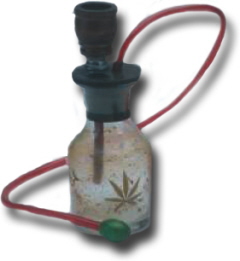
soon to be banned in Australia?
"Police fear a new form of incredibly potent cannabis is destined to hit Australia," wrote the
Herald Sun in breathless prose. "Vietnamese criminal gangs in Canada have developed a sophisticated method of growing the plant indoors all year round. It greatly increases both the yield and potency of the cannabis and drastically cuts back the growing time for each crop," the newspaper reported in article picked up by other Australian media outlets.
"The latest criminal intelligence suggests Australian-based Vietnamese drug dealers have traveled to Canada to learn how to cultivate this new brand of highly addictive cannabis," the Herald Sun continued. "They are expected to use the knowledge to grow and sell it in Australia. This new cannabis threat was revealed yesterday in the Australian Crime Commission's annual Illicit Drug Data Report."
All Headline News more concisely but equally trashily warned that "a new strand of marijuana could be landing on Australian soil which is stronger, supposed more addictive and easier to grow."
The Australian Crime Commission's Illicit Drug Data Report 2005-2006, released this month, was not nearly as dramatic. In its section on cannabis, on which the dire media accounts were based, the report noted:
The majority of cannabis consumed in Australia is domestically produced, with cultivation prolific in all states and territories. While large outdoor bush plots, ranging in size from one to tens of thousands of plants, remain common in some states and territories, the most commonly detected method of cultivating cannabis is through the use of hydroponics (or other enhanced indoor cultivation methods). These are usually detected within residential premises. Although the number of plants is typically lower for hydroponic cultivation, growing cannabis hydroponically means it can be grown all year round and produces a higher yield of 'head' or 'buds' in a shorter period of time.
These enhanced indoor cultivation methods have been refined by Vietnamese criminal groups in Canada to yield high potency cannabis (Royal Canadian Mounted Police, 2002). There are indications that some Vietnamese Australians have traveled to Canada to further their cultivation knowledge and skills. However, it is important to note that no single criminal group dominates cannabis cultivation or supply in Australia.
What both the commission and the newspapers are talking about is nothing more than "BC Bud," or, if grown in the US or Australia "kind bud," or high-THC content marijuana being grown indoors under high-power lights. Kind bud has long been grown Down Under by Australian pot connoisseurs, and the use of hydroponic or other indoor growing systems is also nothing new. In fact, Australia appears to be unique in its peculiar delusion that hydroponic marijuana is somehow different and more dangerous.
Not allowing themselves to be detoured by the facts, Australian politicians are jumping into the fray with proposals to fight the hydro menace by banning pot pipes. According to All Headline News, the New South Wales state government is considering such proposal.
And Radio Australia reported that the national government will consider such a paraphernalia ban in December. Federal Minister Christopher Pyne made the announcement at a meeting of the Ministerial Council on Drug Strategy in Adelaide Saturday. He said the government would also look at how to regulate the advertising of paraphernalia.
The fact that pipes can also be used to smoke tobacco should be no hindrance to a crackdown, he said. "Hiding behind the idea that some of these products might be used for legitimate products [and] legitimate practices flies in the face of common sense," Pyne said. "I think the mums and dads of Australia expect us to take firm action."
back to top
May 18, 1971: Tapes released years later reveal that sometime between 12:16 and 12:35pm, President Nixon says to entertainer Art Linkletter, "... radical demonstrators that were here... two weeks ago... They're all on drugs, virtually all."
May 19, 1988: Carlos Lehder is convicted of drug smuggling and sentenced to life in prison without parole, plus an additional 135 years. He had been captured by the Colombian National Police at a safe house owned by Pablo Escobar and extradited to the US.
May 24, 1988: The domestic hashish seizure record is set (still in effect today) -- 75,066 pounds in San Francisco, California.
May 20, 1991: The domestic heroin seizure record is set (still in effect today) -- 1,071 pounds in Oakland, California.
May 24, 1993: At 3:45pm, Juan Jesús Cardinal Posados Ocampo, the archbishop of Guadalajara, is assassinated at Hidalgo International Airport in Guadalajara by San Diego gang members hired by the Arellano-Felix Organization. As the archbishop's car arrives in the parking lot across the street from the terminal, a young man opens the door and opens fire, while half a dozen other gunmen spray the scene killing the driver and five bystanders, including an old woman, her nephew and a startled businessman with a cell phone in his hand.
May 20, 1997: Eighteen year-old Esequiel Hernandez, Jr., of Redford, Texas, becomes the first American to be killed on American soil by US soldiers in peacetime when he is shot on his own property by camouflaged Marines involved in a Joint Task Force-6 border drug interdiction operation. No drugs are found. Hernandez had never been suspected of or arrested for any criminal or drug-related activity.
May 22, 1997: Milwaukee, Wisconsin, Mayor John Norquist signs a measure into law decriminalizing first time possession of small amounts of marijuana after the proposal squeaks by the city council.
May 23, 2000: Eighty-five US troops arrive in Guatemala to participate in the two-week-long "Operation Maya Jaguar," intended to provide training for Guatemalan police, to carry out seizures of illegal drug shipments, and to facilitate joint counter-narcotics operations.
May 21, 2001: Geraldine Fijneman, head of the Amsterdam branch of the ayahuasca-using Santo Daime church, is acquitted by a Dutch court. Fijneman had owned, transported and distributed a DMT-containing substance, but the court ruled that her constitutional right to Freedom of Religion must be respected.
May 22, 2003: Maryland becomes the ninth state to relax restrictions on medicinal marijuana use for seriously ill patients when Governor Robert L. Ehrlich, Jr. signs a bill reducing the maximum penalty to a $100 fine. The law goes into effect on October 1. Ehrlich, the first Republican governor to sign a bill relaxing penalties for medicinal use of marijuana, signs the measure despite pressure from the Bush administration to veto it.
back to top
Are you a fan of DRCNet, and do you have a web site you'd like to use to spread the word more forcefully than a single link to our site can achieve? We are pleased to announce that DRCNet content syndication feeds are now available. Whether your readers' interest is in-depth reporting as in Drug War Chronicle, the ongoing commentary in our blogs, or info on specific drug war subtopics, we are now able to provide customizable code for you to paste into appropriate spots on your blog or web site to run automatically updating links to DRCNet educational content.
For example, if you're a big fan of Drug War Chronicle and you think your readers would benefit from it, you can have the latest issue's headlines, or a portion of them, automatically show up and refresh when each new issue comes out.
If your site is devoted to marijuana policy, you can run our topical archive, featuring links to every item we post to our site about marijuana -- Chronicle articles, blog posts, event listings, outside news links, more. The same for harm reduction, asset forfeiture, drug trade violence, needle exchange programs, Canada, ballot initiatives, roughly a hundred different topics we are now tracking on an ongoing basis. (Visit the Chronicle main page, right-hand column, to see the complete current list.)
If you're especially into our new Speakeasy blog section, new content coming out every day dealing with all the issues, you can run links to those posts or to subsections of the Speakeasy.
Click here to view a sample of what is available -- please note that the length, the look and other details of how it will appear on your site can be customized to match your needs and preferences.
Please also note that we will be happy to make additional permutations of our content available to you upon request (though we cannot promise immediate fulfillment of such requests as the timing will in many cases depend on the availability of our web site designer). Visit our Site Map page to see what is currently available -- any RSS feed made available there is also available as a javascript feed for your web site (along with the Chronicle feed which is not showing up yet but which you can find on the feeds page linked above). Feel free to try out our automatic feed generator, online here.
Contact us for assistance or to let us know what you are running and where. And thank you in advance for your support.
back to top
RSS feeds are the wave of the future -- and DRCNet now offers them! The latest Drug War Chronicle issue is now available using RSS at http://stopthedrugwar.org/chronicle/feed online.
We have many other RSS feeds available as well, following about a hundred different drug policy subtopics that we began tracking since the relaunch of our web site this summer -- indexing not only Drug War Chronicle articles but also Speakeasy blog posts, event listings, outside news links and more -- and for our daily blog postings and the different subtracks of them. Visit our Site Map page to peruse the full set.
Thank you for tuning in to DRCNet and drug policy reform!
back to top
With the launch of our new web site, The Reformer's Calendar no longer appears as part of the Drug War Chronicle newsletter but is instead maintained as a section of our new web site:
- Visit http://stopthedrugwar.org each day and you'll see a listing of upcoming events in the page's righthand column with the number of days remaining until the next several events coming up and a link to more.
- Check our new online calendar section at to view all of them by month, week or a range of different views.
- We request and invite you to submit your event listings directly on our web site. Note that our new system allows you to post not only a short description as we currently do, but also the entire text of your announcement.
The Reformer's Calendar publishes events large and small of interest to drug policy reformers around the world. Whether it's a major international conference, a demonstration bringing together people from around the region or a forum at the local college, we want to know so we can let others know, too.
But we need your help to keep the calendar current, so please make sure to contact us and don't assume that we already know about the event or that we'll hear about it from someone else, because that doesn't always happen.
We look forward to apprising you of more new features on our web site as they become available.
back to top















